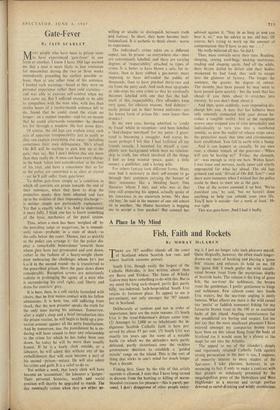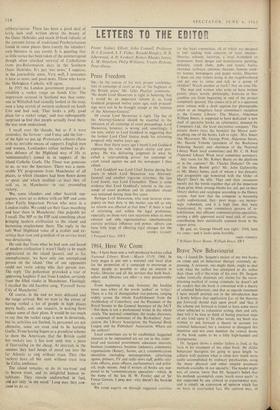A Place In My Mind
Fish, Faith and Rockets
By MORAY
McLAREN
THERE are 787 satellite islands off the coast of Scotland where Scottish law runs and where Scottish customs prevail.
South Uist, though easily the largest of the Catholic Hebrides, is less written about than are Barra and Eriskay. The fame of Whisky Galore may have something to do with this. But in my mind the long sack-shaped, partly gat, partly hilly, sea-indented, loch-besprinkled South Uist retains its foremost place. Its appeal to me is pre-eminent, not only amongst the 787 islands but in Scotland.
Deliberately at random and not in order of importance, here are the main reasons. (1) South Uist is the trout-fisherman's dream come true. (2) Amongst its 2,000 or so inhabitants the in- digenous Scottish Catholic faith is here pre- served by about 95 per cent. (3) South Uist was exactly ten years ago the scene of a notable battle (in which we the defenders were partly defeated, partly victorious) over the reckless government decision to establish a 'guided missile' range on the island. This is the sort of thing that sticks in one's mind for much longer than a decade.
Fishing first. Since by the title of this article egotism is allowed, I state that I have long turned in distaste from the hunting or killing of warm- blooded creatures for pleasure—this is purely per- sonal, I don't disapprove of other people enjoy-
ing it, I just no longer take such pleasure myself. Quite illogically, however, the often much longer- drawn-out sport of hooking and playing a 'game fish' retains and enforces its hold on me. Of the 'game fish' I much prefer the wild unculti- vated brown trout from the mysterious depths of Scottish lochs. The salmon is the king of game fish, the sea-trout the nobleman, the brown trout the gentleman; I prefer gentlemen to kings and noblemen. Few salmon come into South Uist waters, but -the sea-trout angling is justly famous. What allures me more is the wild casual (no 'purist' or faddish nonsense) fishing for my favourite brown trout in the 190 or so scattered lochs of this island. Angling reminiscences for the unaddicted are boring and suspect. Let me just say that the most unalloyed pleasures I have enjoyed amongst my compatriot brown trout have been on this island flung from the body of Scotland (so it would seem by a glance at the map) far out into the Atlantic.
The appeal to me of the islander's deeply and vigorously retained Catholic faith against strong persecution in the past is too, I suppose, of minority interest to most readers of the Spectator. I take pleasure, however, in an- nouncing its fact if only to make a contrast with that picture so sedulously presented by the megalopolitan press of the Hebridean and West Highlander as a morose and savage puritan devoted to secret drinking and wildly ostentatious
sabbatarianism. There has been a good deal of fairly lush stuff written about the beauty of the Outer Hebrides and much ill-bred ridicule of the extreme forms of traditional Presbyterianism found in some places there (surely the islanders' own business in any event). It is puzzling that so little notice has been taken of the uninterrupted though often attacked survival of Catholicism from pre-Reformation days in the Southern Outer Hebrides. It's just 'not news,' I suppose, in the journalistic sense. Very well, I announce it here as news, and good news. Those who know the Hebridean Catholic will agree.
In 1955 the London government proposed to establish a rocket range on South Uist. The impression aroused in Scotland was that some- one in Whitehall had casually looked at the map, seen a long stretch of western seaboard on South Uist and had said, 'That looks a jolly good place fora rocket range,' and was subsequently surprised to find that people actually lived there. He was soon undeceived.
I recall over the 'decade, but as if it were yesterday, the fervour—and I may add the fun—
of the fight we put up. Protestants, atheists (those with no invisible means of support), English men and women, Lowlanders (often inclined to dis- miss defence of the Highland way of life as
'sentimentality') joined in in support of the island Catholic Gaels. The Times was generous to us, so was the Spectator. There was a mem-
orable TV programme from Manchester of all places, to which islanders had been flown down
to, speak and which resulted--at least they all said so, in Manchester- --in our resounding victory.
We, some islanders and other Scottish sup- porters, were set to debate with an MP and some other Fairly Important Person who were in a London studio. We could see their faces mouthing and hear them in Manchester. One palpable hit
I recall. The MP or the FIP said something about
bringing modern civilisation to the island and increasing employment there. The reply in the soft West Highland voice of a crofter and ex- service roan (son and grandson of ex-service men) was devastating.
He said that from what he had seen and heard of modern civilisation it wasn't likely to be much appreciated on the island (pause), and as for unemployment, 'we have only one unemployed person on the island.' One of our opponents
could not resist asking who that person was.
The reply 'The policeman' provoked a roar of approving laughter if not from London, certainly from the filled studio in Manchester. Fleetingly I recalled the old Jacobite song, 'Farewell Sweet City of Manchester.'
Of course, in the end we were defeated and the range arrived. But we won to the extent of having rattled a lot of people in high places pretty badly, and, one suspects, in making them reduce some of their plans. It would be too much to say that the rocket range is now in desuetude, but its activities are limited, its personnel are not obtrusive, some are even said to be learning Gaelic. From having begun as a grandiose scheme to show the Americans that the British could fire rockets too, it has now sunk into a piece of face-saving on the cheap. At intervals in the summer they hurl lumps of metal out into the far Atlantic to sinV without trace. They (the hurlers) have all but sunk without trace into he Celtic ambience.
The island remains, so do its sea-trout and its brown trout, and its delightful human in-
habitants. They remain undisturbed in fact, and not Only 'in my mind.' Long may they con- tinue to do so.



































 Previous page
Previous page